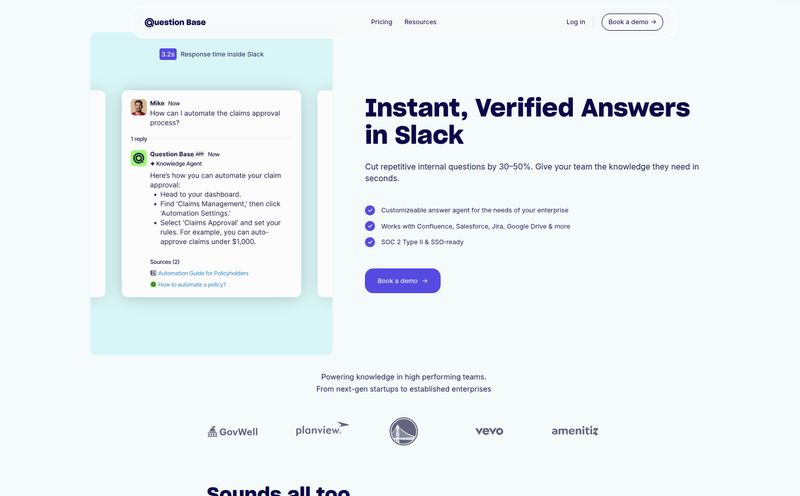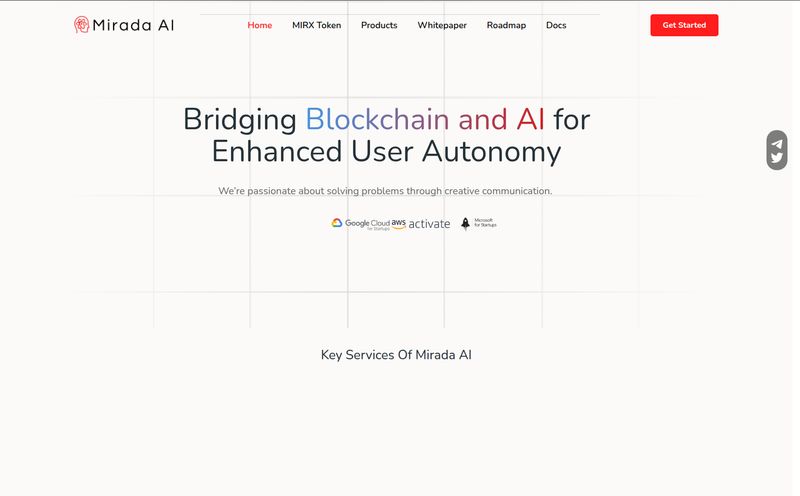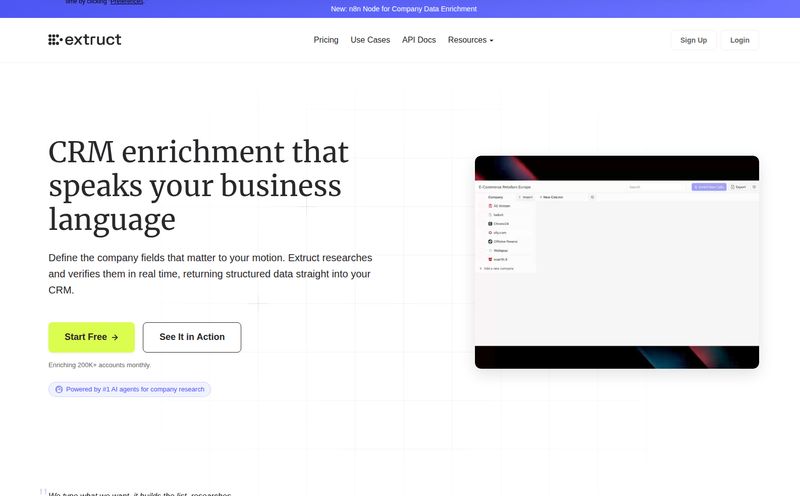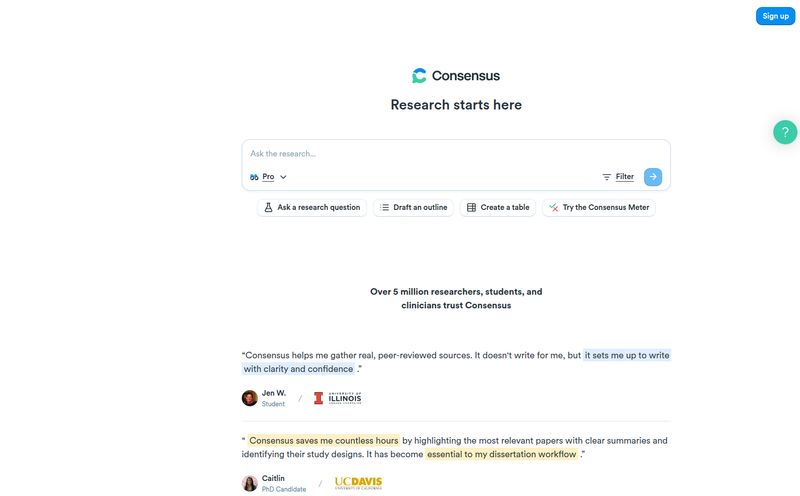As someone who lives and breathes SEO, I have a… complicated relationship with search engines. For years, it’s been a game of cat and mouse with Google. We optimize, they update the algorithm. We build links, they change what a 'good' link is. And through it all, the user experience has gotten, well, crowded. Ads at the top, ads at the bottom, “People Also Ask” boxes, shopping results—sometimes it feels like you have to scroll for an eternity just to get to the first real organic result.
So, when a new tool pops up promising a different way, my ears perk up. I’ve seen countless “Google-killers” come and go. Most are just a flash in the pan. But the recent buzz around generative AI in search, with players like Perplexity making waves, feels different. It feels like a genuine shift. And that’s what brought me to Komo Search.
It bills itself as a private, fast, ad-free AI search engine. Music to my ears. But my first interaction with it was… not what I expected.
First, Let's Talk About What Komo Search Claims to Be
Before I get to my little adventure, what’s the big idea behind Komo? The core concept is moving away from the traditional “list of ten blue links.” Instead of just giving you a directory, Komo wants to take you on a search journey. It uses generative AI to help you deep dive into topics, brainstorm ideas, or even see what a community of users is curious about.
Think of it less like a librarian pointing you to the right aisle and more like a research assistant who sits down with you to chat about your project. The main draws are pretty compelling:
- AI-Powered Everything: It doesn't just fetch information; it synthesizes it, explains it, and helps you explore related concepts.
- Genuinely Ad-Free: A clean, uncluttered interface. No sponsored posts masquerading as top results. Hallelujah.
- Privacy as a Feature: In an age where every click is tracked, Komo promises a private search experience. They're not building a profile on you to sell you more stuff.
It sounds like the search engine we've all been dreaming of during those late-night, caffeine-fueled research sessions, right?
My First (Attempted) Date With Komo
So, I navigated over to komo.ai, ready to have my search world rocked. I was excited. And then… this happened.

Visit Komo Search
"Sorry, you have been blocked."
I had to laugh. Here I am, ready to embrace the future of search, and a Cloudflare security wall stops me at the door. It was a stark reminder that even the most futuristic tech runs on very present-day infrastructure. My best guess? A finicky setting in their security, maybe my IP looked suspicious for some reason. Who knows. It’s the kind of hiccup that can happen with newer platforms still ironing out the kinks.
After a quick refresh and maybe a prayer to the internet gods, I got in. But it was a funny, humbling start. A little bit of digital friction before getting to the promised land.
A Look Inside: The Komo Search Experience
Once past the gatekeeper, I found a minimalist and clean interface. On the left, a simple toolbar with icons for different modes: Search, Chat, and Explore. This is where Komo really starts to differentiate itself.
Diving Deep with AI Search
I started with a standard query. Instead of just a list of links, Komo's 'Quick Answer' feature provides a synthesized summary, much like Google's SGE or Perplexity. But the real power is in the 'Deep Dive' mode. Here, the AI acts like a true research partner, breaking down the topic into sub-sections, raising key questions, and presenting information in a more narrative format. It feels less like searching and more like exploring a mind map.
Brainstorming and Community Exploration
This is probably my favorite part. The 'Chat' feature is a direct line to the AI for brainstorming and discussion. You can throw half-baked ideas at it and see what it spits back. It’s a great tool for getting past writer’s block or thinking around a problem from a new angle.
The 'Explore' feature is also neat. It shows you what other people on the platform are looking into, creating a sort of intellectual zeitgeist. It’s a way to discover topics you didn't even know you were interested in, breaking you out of your own search bubble. It’s a bit like stumbling upon a fascinating conversation in a coffee shop.
The Good, The Not-So-Good, and the AI Weirdness
No tool is perfect, especially not one trying to challenge the biggest company on the internet. After spending some time with it, here's my honest breakdown.
The privacy and ad-free experience are, without a doubt, a 10/10. It’s amazing how much calmer and more focused you feel when your screen isn’t screaming at you. The AI features for brainstorming are also a huge win. I can see myself useing this for content ideation for sure.
However, there are trade-offs. The breadth of results just isn't on par with Google's massive index. For obscure, long-tail searches or very specific technical queries, you might find Komo comes up a little short. And like all current generative AI, it can be confidently wrong sometimes. You still need to apply a layer of critical thinking and cross-reference important facts. Don't take everything the AI says as gospel; it's a guide, not a god.
What's the Price of This Ad-Free Paradise?
This is the million-dollar question, isn't it? How does a company that offers an ad-free service survive? Currently, Komo Search appears to be free to use. Looking at the interface from the screenshot, you can spot 'Enterprise' and 'Premium' labels, which strongly suggests a freemium model is the plan. This is a common strategy: offer a robust free version to build a user base, with advanced features or higher usage limits reserved for paying customers. As of now, though, there's no public pricing page, so you can jump in and try it without pulling out your wallet.
Frequently Asked Questions About Komo Search
- Is Komo Search completely free to use?
- For now, yes. The core search functionalities are free. The presence of 'Premium' and 'Enterprise' tiers suggests that there will likely be paid plans in the future for power users or businesses.
- How does Komo Search make money without ads?
- The likely business model is a freemium one. They'll probably generate revenue from individual 'Premium' subscriptions and 'Enterprise' plans that offer more advanced features, higher usage limits, or team collaboration tools.
- Is Komo Search a better search engine than Google?
- It depends on what you mean by 'better.' For a clean, private, and creative brainstorming experience, some would say yes. For the sheer volume and depth of indexed information for any possible query, Google still holds the crown. They're different tools for different tasks.
- What makes Komo's AI search different from others?
- Its focus is on the 'search journey.' It's not just about delivering a single answer. Features like 'Deep Dive,' 'Brainstorm,' and 'Explore' are designed to facilitate a deeper, more creative process of discovery rather than just simple information retrieval.
- Is my data really private with Komo Search?
- Komo's value proposition is built on privacy. They state they do not track you or create user profiles for advertising. While you should always be mindful of privacy policies, their entire model is a reaction against the data-hungry approach of traditional search engines.
So, Should You Give Komo a Shot?
Absolutely. One hundred percent. Will it replace Google for you overnight? Probably not. Google is too big, too integrated, too much of a utility—like running water. But Komo Search isn't trying to be running water. It’s more like a bottle of high-quality mineral water you reach for when you want a specific, refreshing experience.
Go in with an open mind. Use it for your next creative project, to brainstorm a new business idea, or just to see what the world is curious about. It’s a fascinating glimpse into a future where search is less of a chore and more of a conversation. And even if you get blocked at the door on your first try, I promise it’s worth refreshing the page.



